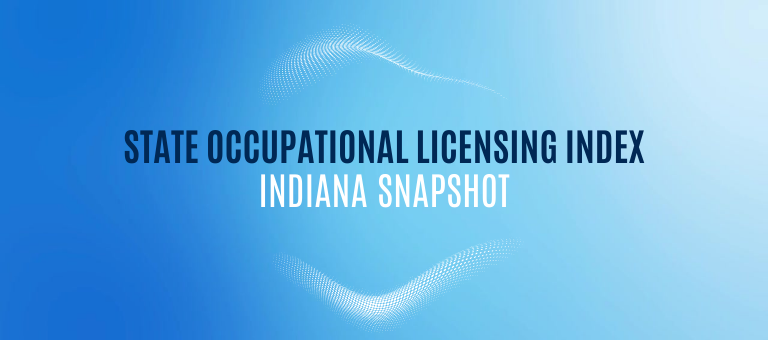
A Snapshot of Occupational Licensing in Indiana
January 25, 2024
A Snapshot of Occupational Licensing in Wyoming
January 30, 2024New Hampshire Should Open the Door to Skilled Workers
Edward Timmons
Director, Knee Center for the Study of Occupational Regulation, West Virginia University
Senior Research Fellow, Archbridge Institute
New Hampshire House Executive Departments and Administration Committee
January 25, 2024
Chair McGuire and all distinguished members of the New Hampshire House Executive Departments and Administration Committee:
Thank you for allowing me to comment regarding licensing reform in New Hampshire. I am an associate professor of economics and director of the Knee Regulatory Research Center at West Virginia University. I am also a senior research fellow with the Archbridge Institute.
The main takeaways of my comments are the following:
- New Hampshire has had difficulty attracting workers and is experiencing a skilled worker shortage.
- My research shows that universal recognition increases in-migration by almost 50% and also improves the labor market for existing residents.
- The benefits of the reform are largest for states that do not use “substantially similar” language
The State of the New Hampshire Labor Market
Employers in New Hampshire are having a difficult time finding and recruiting new skilled workers. A recent report by the US Department of Commerce ranks New Hamsphire as having one of the most severe worker shortages nationally. It is estimated that late last year New Hamsphire had only 28 available workers for every 100 jobs available statewide.[1] Although a number of efforts have already been taken to recruit workers in the state, it is also important to reconsider existing laws and regulations to make sure that they are not dissuading new residents from moving to New Hampshire or blocking existing New Hampshire residents from meeting their full potential in the labor market.
Occupational Licensing in New Hampshire
Occupational licensing is the most stringent form of professional regulation. It forbids New Hampshire residents from working in a profession before meeting entry requirements including achieving minimum levels of education, passing exams, and paying fees to the state. Estimates suggest that 16 percent of workers in New Hampshire are licensed.[2] By erecting barriers to entering professions in the state, occupational licensing imposes a multitude of costs upon consumers and eliminates more than 8,000 jobs in the state each year.[3]
Turning to mobility, economic research estimates that stringent occupational licensing reduces geographic mobility by as much as 7 percent.[4] There is a simple intuitive explanation for this finding: not allowing Americans to transfer their licenses and practice the craft that they have already been trained to do dissuades Americans from moving. The needless burden of new exams or additional education before being permitted to practice is too great.
Universal Recognition
New Hampshire is currently one of 21 states that recognizes the licenses from other states. Arizona passed this reform in 2019.[5] Iowa and Missouri passed similar legislation in 2020.[6] Last year, Ohio, Arkansas, and Virginia also passed similar legislation.[7]
Research by myself and colleagues at the Knee Regulatory Research Center has estimated the effects of states passing this reform. One paper finds that universal recognition boosts tax receipts for states that pass the reform by $1.7 million per county in border counties.[8] My own research shows that passing universal recognition boosts employment of licensed workers by nearly a full percentage point.[9] Further, our research shows that residents will have an easier time finding work as unemployment will decrease and labor force participation will increase in the state following the passage of universal recognition. Further, our work suggests that states on average experience a 50% increase in in-migration.
There are only two words that currently limit New Hamsphire workers and residents from receiving the full benefits of this reform: “substantially similar.” Eliminating these two words and simply recognizing licenses from other states will maximize the benefits of this reform. In fact, our research shows that states like Iowa and Missouri that do not require aspiring workers to have “substantially similar” requirements had the largest employment gains from universal recognition.[10]
With the current state of New Hampshire’s labor market, it seems silly to force new residents to complete arbitrary hurdles to begin working. Research shows that preventing occupational licenses from easily transferring reduces mobility. Eliminating these barriers improves the labor market for both new and existing residents. New Hampshire can look to other states, such as Iowa and Missouri, for guidance on how to improve the labor market with commonsense occupational licensing reform.
[1] https://www.uschamber.com/workforce/understanding-new-hampshire-labor-market
[2] Morris M. Kleiner and Evgeny S. Vorotnikov, At What Cost? State and National Estimates of the
Economic Costs of Occupational Licensing (Arlington, VA: Institute for Justice, November 2018).
[3] Kleiner and Vorotnikov, At What Cost?
[4] Janna E. Johnson and Morris M. Kleiner, “Is Occupational Licensing a Barrier to Interstate Migration?,” American Economic Journal: Economic Policy 12, no. 3 (2020): 347–73.
[5] Office of the Governor of Arizona, Arizona – First in the Nation: Universal Licensing Recognition, n.d., https://azgovernor.gov/sites/default/files/universallicensingrecognition1_0.pdf.
[6] Office of the Governor of Iowa, “Gov. Reynolds Signs Comprehensive Licensure Legislation,” press release, June 25, 2020, https://governor.iowa.gov/press-release/gov-reynolds-signs-comprehensive-licensure-legislation; Cameron Gerber, “Parson Expands License Reciprocity in Missouri,” Missouri Times, July 6, 2020.
[7]https://reason.com/2023/01/18/ohio-to-honor-occupational-licenses-from-other-states/; https://www.cato.org/blog/arkansas-alabama-make-much-needed-progress-occupational-licensing-reform; http://www.dpor.virginia.gov/news/NewsReleases_UniversalLicenseRecognition
[8] Darwyyn Deyo and Alicia Plemmons, “Have license, will travel: Measuring the effects of universal licensing recognition on mobility,” Economics Letters 219 (2022).
[9] Bae, Kihwan and Timmons, Edward, “Now You Can Take It with You: Effects of Occupational Credential Recognition on Labor Market Outcomes” (2023). Economics Faculty Working Papers Series. 70.
[10] Bae, Kihwan and Timmons, Edward, “Now You Can Take It with You: Effects of Occupational Credential Recognition on Labor Market Outcomes” (2023). Economics Faculty Working Papers Series. 70.


